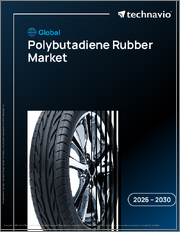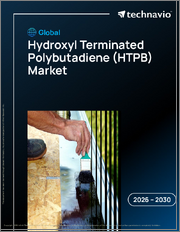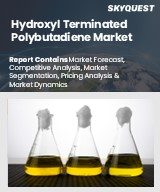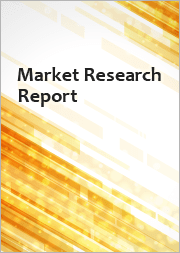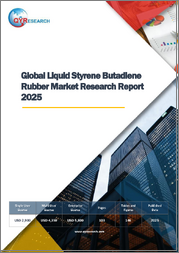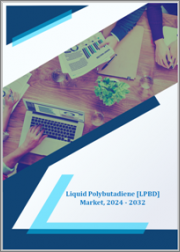
|
시장보고서
상품코드
1501189
액상 폴리부타디엔(LPBD) 시장 : 성장, 향후 전망, 경쟁 분석(2024-2032년)Liquid Polybutadiene [LPBD] Market - Growth, Future Prospects and Competitive Analysis, 2024 - 2032 |
||||||
2024년부터 2032년까지 연평균 5.3%의 성장률을 보일 것으로 예상되는 LPBD 시장은 자동차, 화학, 산업, 주거 및 건설, 전자, 기타 스포츠 등 다양한 최종 용도 분야에서 활발한 수요를 보이고 있습니다. 또한, 접착제 및 실란트, 고무 화합물 및 엘라스토머, 타이어 제조, 전기 절연, 폴리머/수지 개질, 페인트 및 코팅, 가소제 및 보호 필름 등의 용도로도 확대되고 있습니다.
주요 시장 활성화 요인
자동차 산업이 수요를 주도
자동차 산업은 LPBD 시장에 큰 수익과 높은 CAGR을 가져다주는 중요한 원동력이며, 2023년에는 높은 탄력성, 저온 유연성, 내충격성 등 우수한 특성으로 인해 자동차 응용 분야에서 LPBD의 채택이 증가하고 있는 것이 그 증거로 작용할 것으로 예상됩니다. 2024년부터 2032년까지 예측 기간 동안 자동차 산업은 자동차 제조의 기술 혁신과 고성능 소재에 대한 수요 증가에 힘입어 성장세를 이어갈 것으로 예상됩니다.
화학 산업 - 다양한 응용 분야
화학 산업은 LPBD의 주요 견인차 역할을 하며 수익과 CAGR에 크게 기여하고 있으며, 2023년 LPBD는 화학 부문, 특히 접착제 및 실란트, 폴리머/수지 개질, 페인트/코팅에서 다양한 용도를 발견했습니다. 이를 증명하듯, LPBD는 화학 제조업체에 대한 판매로 큰 수익을 창출하고 있으며, LPBD는 다양한 화학제품의 성능을 향상시키는 데 중요한 역할을 하고 있으며, 앞으로도 지속적인 성장이 예상됩니다.
산업 응용 및 회복력
산업 응용 분야는 LPBD 시장의 강력한 촉진요인으로 주목할 만한 수익과 CAGR을 보이고 있으며, LPBD의 탄력성, 화학적 안정성 및 내충격성은 다양한 산업 응용 분야에서 선호되고 있으며, 2023년에는 전기 절연 및 산업 부품용 고무 화합물과 같은 산업에서 LPBD의 채택이 증가했습니다. 2024년부터 2032년까지의 예측 기간 동안 산업 환경에서 내구성이 뛰어난 고성능 소재에 대한 수요로 인해 산업 응용 분야에서 지속적인 성장이 예상됩니다.
억제요인 : 주택 및 건설의 환경 문제
LPBD 시장은 긍정적인 요인에도 불구하고, 주택 및 건설 분야에서 환경 문제라는 뚜렷한 시장 억제요인에 직면해 있습니다. 2024년부터 2032년까지의 예측 기간 동안 LPBD가 주택 및 건설 분야에서 성장 궤도를 유지하기 위해서는 이러한 환경 문제에 대한 대응이 필수적입니다. 친환경 대체재와 지속가능한 건설 방법의 혁신은 이러한 장애요인을 극복하는 데 필수적입니다.
시장 세분화 분석
시장 : 최종 용도별
최종 용도별로 LPBD 시장을 분류하면 자동차, 화학, 산업, 주거 및 건설, 전자, 스포츠 등의 분야가 있으며, 2023년에는 자동차 부문이 매출과 CAGR 모두에서 선두를 차지하며 우위를 점하고 있습니다. 그러나 2024년부터 2032년까지의 예측에서는 변화가 예상되며, 산업 부문이 가장 높은 CAGR로 부상할 것으로 예상되어 시장 역학의 진화를 시사하고 있습니다.
시장 : 용도별
용도별 시장 세분화에는 접착제 및 실란트, 고무 화합물 및 엘라스토머, 타이어 제조, 전기 절연, 폴리머/수지 개질, 페인트 및 코팅, 기타(가소제, 보호 필름 등)가 포함되며, 2023년에는 타이어 제조가 매출과 가장 높은 CAGR을 이끌었습니다. 향후 2024년부터 2032년까지의 예측 기간 동안 타이어 제조가 매출에서 선두를 유지하는 반면, 접착제 및 실란트가 가장 높은 CAGR을 기록할 것으로 예상되어 변화가 예상됩니다.
북미, 세계 리더로 자리매김
지역별로 보면 LPBD 시장은 다양한 추세를 보이고 있습니다. 자동차 산업과 공업 산업이 발달한 아시아태평양은 가장 높은 CAGR을 기록한 지역입니다. 반면, 북미는 견조한 화학 산업과 건설 활동의 증가에 힘입어 매출 비중에서 선두를 달리고 있습니다. 이러한 지리적 변동은 시장을 포괄적으로 이해하기 위해 지역적 역학을 고려하는 것이 중요하다는 것을 강조합니다.
예측 기간 동안 심화될 시장 경쟁
경쟁사로는 SIBUR International GmbH, Kuraray Corporation, The Dow Chemical Company, Evonik Industries AG, Synthomer plc, Nippon Soda Co.Valley, Arlanxeo 등이 2023년 견조한 매출을 기록했습다. SIBUR International은 전략적으로 제품 포트폴리오를 확장하고, Kuraray는 지리적 확장에 중점을 두었으며, The Dow Chemical Company는 LPBD 응용 분야의 혁신에 중점을 두었습니다. 이러한 전략은 각각의 수익 성장에 기여했습니다. 2024년부터 2032년까지의 예측 기간 동안에도 이들 기업은 전략적 접근을 지속할 것으로 예상되며, 시장 경쟁력의 지속을 반영하는 수익이 예상됩니다.
본 보고서에서 답변하는 주요 질문
액상 폴리부타디엔(LPBD) 시장의 성장에 영향을 미치는 주요 미시적 및 거시적 환경 요인은 무엇인가?
현재 및 예측 기간 동안 제품 부문 및 지역에 대한 주요 투자 포켓은 무엇인가?
2032년까지의 추정치 및 시장 전망
예측 기간 동안 가장 빠른 CAGR을 보일 부문은?
시장 점유율이 높은 부문과 그 이유는?
중저소득 국가는 액상 폴리부타디엔(LPBD) 시장에 투자하고 있는가?
액상 폴리부타디엔(LPBD) 시장에서 가장 큰 지역 시장은 어디인가?
아시아태평양, 라틴아메리카, 중동 및 아프리카 등 신흥 시장의 시장 동향과 역학은?
액상 폴리부타디엔(LPBD) 시장의 성장을 촉진하는 주요 동향은?
세계 액상 폴리부타디엔(LPBD) 시장에서 입지를 강화하기 위한 주요 경쟁사 및 주요 전략은?
목차
제1장 서문
- 보고서 내용
- 보고서 목적
- 대상자
- 주요 제공
- 시장 세분화
- 조사 방법
- 단계 I - 2차 조사
- 단계II - 1차 조사
- 단계 III - 전문가 패널 리뷰
- 가정
- 채용한 접근법
제2장 주요 요약
제3장 액상 폴리부타디엔(LPBD) 시장 : 경쟁 분석
- 주요 벤더의 시장 포지셔닝
- 벤더가 채용하는 전략
- 주요 산업 전략
- 계층 분석 : 2023 vs 2032
제4장 액상 폴리부타디엔(LPBD) 시장 : 거시적 분석과 시장 역학
- 소개
- 세계의 액상 폴리부타디엔(LPBD) 시장 금액, 2022-2032년
- 시장 역학
- 시장 성장 촉진요인
- 시장 성장 억제요인
- 주요 과제
- 주요 기회
- 성장 촉진요인과 억제요인의 영향 분석
- See-Saw 분석
- Porter's Five Forces 모델
- 구매자의 교섭력
- 구매자의 교섭력
- 대체품의 위협
- 신규 참여업체의 위협
- 경쟁 기업 간의 경쟁 관계
- PESTEL 분석
- 정치 상황
- 경제 상황
- 테크놀러지 상황
- 법적인 상황
- 사회 상황
제5장 액상 폴리부타디엔(LPBD) 시장 : 용도별, 2022-2032년
- 시장 개요
- 성장·매출 분석 : 2023 vs 2032
- 시장 세분화
- 접착제·실란트
- 고무 컴파운드·엘라스토머
- 타이어 제조
- 전기 절연
- 폴리머/수지 개질
- 페인트 및 코팅
- 기타(가소제 보호 필름 등)
제6장 액상 폴리부타디엔(LPBD) 시장 : 최종 용도별, 2022-2032년
- 시장 개요
- 성장·매출 분석 : 2023 vs 2032
- 시장 세분화
- 자동차
- 화학
- 산업
- 주택·건설
- 일렉트로닉스
- 기타(스포츠 등)
제7장 북미의 액상 폴리부타디엔(LPBD) 시장, 2022-2032년
- 시장 개요
- 액상 폴리부타디엔(LPBD) 시장 : 용도별, 2022-2032년
- 액상 폴리부타디엔(LPBD) 시장 : 최종 용도별, 2022-2032년
- 액상 폴리부타디엔(LPBD) 시장 : 지역별, 2022-2032년
- 북미
- 미국
- 캐나다
- 기타 북미
- 북미
제8장 영국 및 유럽연합의 액상 폴리부타디엔(LPBD) 시장, 2022-2032년
- 시장 개요
- 액상 폴리부타디엔(LPBD) 시장 : 용도별, 2022-2032년
- 액상 폴리부타디엔(LPBD) 시장 : 최종 용도별, 2022-2032년
- 액상 폴리부타디엔(LPBD) 시장 : 지역별, 2022-2032년
- 영국 및 유럽연합
- 영국
- 독일
- 스페인
- 이탈리아
- 프랑스
- 기타 유럽
- 영국 및 유럽연합
제9장 아시아태평양의 액상 폴리부타디엔(LPBD) 시장, 2022-2032년
- 시장 개요
- 액상 폴리부타디엔(LPBD) 시장 : 용도별, 2022-2032년
- 액상 폴리부타디엔(LPBD) 시장 : 최종 용도별, 2022-2032년
- 액상 폴리부타디엔(LPBD) 시장 : 지역별, 2022-2032년
- 아시아태평양
- 중국
- 일본
- 인도
- 호주
- 한국
- 기타 아시아태평양
- 아시아태평양
제10장 라틴아메리카의 액상 폴리부타디엔(LPBD) 시장, 2022-2032년
- 시장 개요
- 액상 폴리부타디엔(LPBD) 시장 : 용도별, 2022-2032년
- 액상 폴리부타디엔(LPBD) 시장 : 최종 용도별, 2022-2032년
- 액상 폴리부타디엔(LPBD) 시장 : 지역별, 2022-2032년
- 라틴아메리카
- 브라질
- 멕시코
- 기타 라틴아메리카
- 라틴아메리카
제11장 중동 및 아프리카의 액상 폴리부타디엔(LPBD) 시장, 2022-2032년
- 시장 개요
- 액상 폴리부타디엔(LPBD) 시장 : 용도별, 2022-2032년
- 액상 폴리부타디엔(LPBD) 시장 : 최종 용도별, 2022-2032년
- 액상 폴리부타디엔(LPBD) 시장 : 지역별, 2022-2032년
- 중동 및 아프리카
- GCC
- 아프리카
- 기타 중동 및 아프리카
- 중동 및 아프리카
제12장 기업 개요
- SIBUR International GmbH
- Kuraray Co. Ltd.
- The Dow Chemical Company
- Evonik Industries AG.
- Synthomer plc.
- Nippon Soda Co. Ltd
- SABIC
- Idemitsu Kosan Co.Ltd.
- Cray Valley
- Arlanxeo
- 기타 주요 기업
The liquid polybutadiene [LPBD] market is expected to grow at a CAGR of 5.3% during the forecast period of 2024 to 2032, as indicated by key conclusions drawn from its dynamic landscape. The LPBD market is characterized by robust demand across end-use sectors such as automotive, chemical, industrial, housing & construction, electronics, and others including sports. Additionally, applications span across adhesives & sealants, rubber compounds & elastomers, tire manufacturing, electrical insulation, polymer/resin modification, paints & coatings, and others like plasticizers and protective films.
Key Market Drivers
Automotive Sector Driving Demand
The automotive industry stands out as a significant driver, contributing both substantial revenue and a high CAGR to the LPBD market. In 2023, the evidence lies in the increased adoption of LPBD in automotive applications, driven by its excellent properties such as high resilience, low-temperature flexibility, and impact resistance. LPBD's role in tire manufacturing and rubber compounds for automotive components has propelled its prominence. Looking ahead to the forecast period from 2024 to 2032, the automotive sector is expected to maintain its growth trajectory, fueled by innovations and increasing demand for high-performance materials in the automotive manufacturing landscape.
Chemical Industry - Versatile Applications
The chemical industry emerges as a key driver for LPBD, contributing significantly to both revenue and CAGR. In 2023, LPBD found versatile applications in the chemical sector, particularly in adhesives & sealants, polymer/resin modification, and paints & coatings. The evidence lies in the substantial revenue generated from LPBD sales to chemical manufacturers. The forecast anticipates sustained growth, emphasizing the crucial role of LPBD in enhancing the performance of various chemical products.
Industrial Applications and Resilience
Industrial applications form a robust driver for the LPBD market, showcasing noteworthy revenue and CAGR. LPBD's resilience, chemical stability, and impact resistance make it a preferred choice in various industrial applications. In 2023, industries such as electrical insulation and rubber compounds for industrial components witnessed increased adoption of LPBD. The forecast period from 2024 to 2032 expects continued growth in industrial applications, driven by the need for durable and high-performance materials in industrial settings.
Restraint: Environmental Concerns in Housing & Construction
Despite the positive drivers, the LPBD market faces a notable restraint in the form of environmental concerns associated with housing & construction applications. The evidence is seen in the growing awareness and regulations about the environmental impact of construction materials. In the forecast period from 2024 to 2032, addressing these environmental concerns becomes imperative for LPBD to maintain its growth trajectory in the housing & construction sector. Innovations in eco-friendly alternatives and sustainable construction practices are essential to overcome this restraint.
Market Segmentation Analysis
Market by End Use
The LPBD market segmentation by end-use covers automotive, chemical, industrial, housing & construction, electronics, and others such as sports. In 2023, the automotive sector led in both revenue and highest CAGR, showcasing its dominance. However, the forecast from 2024 to 2032 anticipates a shift, with the industrial sector expected to emerge with the highest CAGR, signaling evolving market dynamics.
Market by Application
Market segmentation by application encompasses adhesives & sealants, rubber compounds & elastomers, tire manufacturing, electrical insulation, polymer/resin modification, paints & coatings, and others including plasticizers and protective films. In 2023, tire manufacturing led in both revenue and highest CAGR. Looking ahead, the forecast period from 2024 to 2032 indicates a shift, with adhesives & sealants expected to exhibit the highest CAGR, while tire manufacturing maintains the lead in revenue.
North America Remains the Global Leader
Geographically, the LPBD market exhibits diverse trends. Asia-Pacific, with its thriving automotive and industrial sectors, emerges as the region with the highest CAGR. Meanwhile, North America, driven by a robust chemical industry and increasing construction activities, leads in revenue percentage. These geographic variations underscore the importance of considering regional dynamics for a comprehensive understanding of the market.
Market Competition to Intensify during the Forecast Period
In the competitive landscape, top players such as SIBUR International GmbH, Kuraray Co., Ltd., The Dow Chemical Company, Evonik Industries AG., Synthomer plc., Nippon Soda Co. Ltd, SABIC, Idemitsu Kosan Co.,Ltd., Cray Valley, and Arlanxeo have demonstrated robust revenues in 2023. SIBUR International strategically expanded its product portfolio, Kuraray focused on geographical expansion, and The Dow Chemical Company emphasized innovations in LPBD applications. These strategies contributed to their respective revenue growth. Looking ahead to the forecast period from 2024 to 2032, these companies are expected to continue their strategic approaches, with anticipated revenues reflecting sustained market competitiveness.
Historical & Forecast Period
This study report represents an analysis of each segment from 2022 to 2032 considering 2023 as the base year. Compounded Annual Growth Rate (CAGR) for each of the respective segments estimated for the forecast period of 2024 to 2032.
The current report comprises quantitative market estimations for each micro market for every geographical region and qualitative market analysis such as micro and macro environment analysis, market trends, competitive intelligence, segment analysis, porters five force model, top winning strategies, top investment markets, emerging trends & technological analysis, case studies, strategic conclusions and recommendations and other key market insights.
Research Methodology
The complete research study was conducted in three phases, namely: secondary research, primary research, and expert panel review. The key data points that enable the estimation of Liquid Polybutadiene [LPBD] market are as follows:
Research and development budgets of manufacturers and government spending
Revenues of key companies in the market segment
Number of end users & consumption volume, price, and value.
Geographical revenues generated by countries considered in the report
Micro and macro environment factors that are currently influencing the Liquid Polybutadiene [LPBD] market and their expected impact during the forecast period.
Market forecast was performed through proprietary software that analyzes various qualitative and quantitative factors. Growth rate and CAGR were estimated through intensive secondary and primary research. Data triangulation across various data points provides accuracy across various analyzed market segments in the report. Application of both top-down and bottom-up approach for validation of market estimation assures logical, methodical, and mathematical consistency of the quantitative data.
Market Segmentation
Application
- Adhesives & Sealants
- Rubber Compounds & Elastomers
- Tire Manufacturing
- Electrical Insulation
- Polymer/Resin Modification
- Paints & Coatings
- Others (Plasticizer, Protective Films, etc.)
End Use
- Automotive
- Chemical
- Industrial
- Housing & Construction
- Electronics
- Others (Sports, etc.)
Region Segment (2022-2032; US$ Million)
North America
U.S.
Canada
Rest of North America
UK and European Union
UK
Germany
Spain
Italy
France
Rest of Europe
Asia Pacific
China
Japan
India
Australia
South Korea
Rest of Asia Pacific
Latin America
Brazil
Mexico
Rest of Latin America
Middle East and Africa
GCC
Africa
Rest of Middle East and Africa
Key questions answered in this report
What are the key micro and macro environmental factors that are impacting the growth of Liquid Polybutadiene [LPBD] market?
What are the key investment pockets concerning product segments and geographies currently and during the forecast period?
Estimated forecast and market projections up to 2032.
Which segment accounts for the fastest CAGR during the forecast period?
Which market segment holds a larger market share and why?
Are low and middle-income economies investing in the Liquid Polybutadiene [LPBD] market?
Which is the largest regional market for Liquid Polybutadiene [LPBD] market?
What are the market trends and dynamics in emerging markets such as Asia Pacific, Latin America, and Middle East & Africa?
Which are the key trends driving Liquid Polybutadiene [LPBD] market growth?
Who are the key competitors and what are their key strategies to enhance their market presence in the Liquid Polybutadiene [LPBD] market worldwide?
Table of Contents
1. Preface
- 1.1. Report Description
- 1.1.1. Purpose of the Report
- 1.1.2. Target Audience
- 1.1.3. Key Offerings
- 1.2. Market Segmentation
- 1.3. Research Methodology
- 1.3.1. Phase I - Secondary Research
- 1.3.2. Phase II - Primary Research
- 1.3.3. Phase III - Expert Panel Review
- 1.3.4. Assumptions
- 1.3.5. Approach Adopted
2. Executive Summary
- 2.1. Market Snapshot: Global Liquid Polybutadiene [LPBD] Market
- 2.2. Global Liquid Polybutadiene [LPBD] Market, By Application, 2023 (US$ Million)
- 2.3. Global Liquid Polybutadiene [LPBD] Market, By End Use, 2023 (US$ Million)
- 2.4. Global Liquid Polybutadiene [LPBD] Market, By Geography, 2023 (US$ Million)
- 2.5. Attractive Investment Proposition by Geography, 2023
3. Liquid Polybutadiene [LPBD] Market: Competitive Analysis
- 3.1. Market Positioning of Key Liquid Polybutadiene [LPBD] Market Vendors
- 3.2. Strategies Adopted by Liquid Polybutadiene [LPBD] Market Vendors
- 3.3. Key Industry Strategies
- 3.4. Tier Analysis 2023 Versus 2032
4. Liquid Polybutadiene [LPBD] Market: Macro Analysis & Market Dynamics
- 4.1. Introduction
- 4.2. Global Liquid Polybutadiene [LPBD] Market Value, 2022 - 2032, (US$ Million)
- 4.3. Market Dynamics
- 4.3.1. Market Drivers
- 4.3.2. Market Restraints
- 4.3.3. Key Challenges
- 4.3.4. Key Opportunities
- 4.4. Impact Analysis of Drivers and Restraints
- 4.5. See-Saw Analysis
- 4.6. Porter's Five Force Model
- 4.6.1. Supplier Power
- 4.6.2. Buyer Power
- 4.6.3. Threat Of Substitutes
- 4.6.4. Threat Of New Entrants
- 4.6.5. Competitive Rivalry
- 4.7. PESTEL Analysis
- 4.7.1. Political Landscape
- 4.7.2. Economic Landscape
- 4.7.3. Technology Landscape
- 4.7.4. Legal Landscape
- 4.7.5. Social Landscape
5. Liquid Polybutadiene [LPBD] Market: By Application, 2022-2032, USD (Million)
- 5.1. Market Overview
- 5.2. Growth & Revenue Analysis: 2023 Versus 2032
- 5.3. Market Segmentation
- 5.3.1. Adhesives & Sealants
- 5.3.2. Rubber Compounds & Elastomers
- 5.3.3. Tire Manufacturing
- 5.3.4. Electrical Insulation
- 5.3.5. Polymer/Resin Modification
- 5.3.6. Paints & Coatings
- 5.3.7. Others (Plasticizer, Protective Films, etc.)
6. Liquid Polybutadiene [LPBD] Market: By End Use, 2022-2032, USD (Million)
- 6.1. Market Overview
- 6.2. Growth & Revenue Analysis: 2023 Versus 2032
- 6.3. Market Segmentation
- 6.3.1. Automotive
- 6.3.2. Chemical
- 6.3.3. Industrial
- 6.3.4. Housing & Construction
- 6.3.5. Electronics
- 6.3.6. Others (Sports, etc.)
7. North America Liquid Polybutadiene [LPBD] Market, 2022-2032, USD (Million)
- 7.1. Market Overview
- 7.2. Liquid Polybutadiene [LPBD] Market: By Application, 2022-2032, USD (Million)
- 7.3. Liquid Polybutadiene [LPBD] Market: By End Use, 2022-2032, USD (Million)
- 7.4.Liquid Polybutadiene [LPBD] Market: By Region, 2022-2032, USD (Million)
- 7.4.1.North America
- 7.4.1.1. U.S.
- 7.4.1.1.1. Liquid Polybutadiene [LPBD] Market: By Application, 2022-2032, USD (Million)
- 7.4.1.1.2. Liquid Polybutadiene [LPBD] Market: By End Use, 2022-2032, USD (Million)
- 7.4.1.2. Canada
- 7.4.1.2.1. Liquid Polybutadiene [LPBD] Market: By Application, 2022-2032, USD (Million)
- 7.4.1.2.2. Liquid Polybutadiene [LPBD] Market: By End Use, 2022-2032, USD (Million)
- 7.4.1.3. Rest of North America
- 7.4.1.3.1. Liquid Polybutadiene [LPBD] Market: By Application, 2022-2032, USD (Million)
- 7.4.1.3.2. Liquid Polybutadiene [LPBD] Market: By End Use, 2022-2032, USD (Million)
- 7.4.1.1. U.S.
- 7.4.1.North America
8. UK and European Union Liquid Polybutadiene [LPBD] Market, 2022-2032, USD (Million)
- 8.1. Market Overview
- 8.2. Liquid Polybutadiene [LPBD] Market: By Application, 2022-2032, USD (Million)
- 8.3. Liquid Polybutadiene [LPBD] Market: By End Use, 2022-2032, USD (Million)
- 8.4.Liquid Polybutadiene [LPBD] Market: By Region, 2022-2032, USD (Million)
- 8.4.1.UK and European Union
- 8.4.1.1. UK
- 8.4.1.1.1. Liquid Polybutadiene [LPBD] Market: By Application, 2022-2032, USD (Million)
- 8.4.1.1.2. Liquid Polybutadiene [LPBD] Market: By End Use, 2022-2032, USD (Million)
- 8.4.1.2. Germany
- 8.4.1.2.1. Liquid Polybutadiene [LPBD] Market: By Application, 2022-2032, USD (Million)
- 8.4.1.2.2. Liquid Polybutadiene [LPBD] Market: By End Use, 2022-2032, USD (Million)
- 8.4.1.3. Spain
- 8.4.1.3.1. Liquid Polybutadiene [LPBD] Market: By Application, 2022-2032, USD (Million)
- 8.4.1.3.2. Liquid Polybutadiene [LPBD] Market: By End Use, 2022-2032, USD (Million)
- 8.4.1.4. Italy
- 8.4.1.4.1. Liquid Polybutadiene [LPBD] Market: By Application, 2022-2032, USD (Million)
- 8.4.1.4.2. Liquid Polybutadiene [LPBD] Market: By End Use, 2022-2032, USD (Million)
- 8.4.1.5. France
- 8.4.1.5.1. Liquid Polybutadiene [LPBD] Market: By Application, 2022-2032, USD (Million)
- 8.4.1.5.2. Liquid Polybutadiene [LPBD] Market: By End Use, 2022-2032, USD (Million)
- 8.4.1.6. Rest of Europe
- 8.4.1.6.1. Liquid Polybutadiene [LPBD] Market: By Application, 2022-2032, USD (Million)
- 8.4.1.6.2. Liquid Polybutadiene [LPBD] Market: By End Use, 2022-2032, USD (Million)
- 8.4.1.1. UK
- 8.4.1.UK and European Union
9. Asia Pacific Liquid Polybutadiene [LPBD] Market, 2022-2032, USD (Million)
- 9.1. Market Overview
- 9.2. Liquid Polybutadiene [LPBD] Market: By Application, 2022-2032, USD (Million)
- 9.3. Liquid Polybutadiene [LPBD] Market: By End Use, 2022-2032, USD (Million)
- 9.4.Liquid Polybutadiene [LPBD] Market: By Region, 2022-2032, USD (Million)
- 9.4.1.Asia Pacific
- 9.4.1.1. China
- 9.4.1.1.1. Liquid Polybutadiene [LPBD] Market: By Application, 2022-2032, USD (Million)
- 9.4.1.1.2. Liquid Polybutadiene [LPBD] Market: By End Use, 2022-2032, USD (Million)
- 9.4.1.2. Japan
- 9.4.1.2.1. Liquid Polybutadiene [LPBD] Market: By Application, 2022-2032, USD (Million)
- 9.4.1.2.2. Liquid Polybutadiene [LPBD] Market: By End Use, 2022-2032, USD (Million)
- 9.4.1.3. India
- 9.4.1.3.1. Liquid Polybutadiene [LPBD] Market: By Application, 2022-2032, USD (Million)
- 9.4.1.3.2. Liquid Polybutadiene [LPBD] Market: By End Use, 2022-2032, USD (Million)
- 9.4.1.4. Australia
- 9.4.1.4.1. Liquid Polybutadiene [LPBD] Market: By Application, 2022-2032, USD (Million)
- 9.4.1.4.2. Liquid Polybutadiene [LPBD] Market: By End Use, 2022-2032, USD (Million)
- 9.4.1.5. South Korea
- 9.4.1.5.1. Liquid Polybutadiene [LPBD] Market: By Application, 2022-2032, USD (Million)
- 9.4.1.5.2. Liquid Polybutadiene [LPBD] Market: By End Use, 2022-2032, USD (Million)
- 9.4.1.6. Rest of Asia Pacific
- 9.4.1.6.1. Liquid Polybutadiene [LPBD] Market: By Application, 2022-2032, USD (Million)
- 9.4.1.6.2. Liquid Polybutadiene [LPBD] Market: By End Use, 2022-2032, USD (Million)
- 9.4.1.1. China
- 9.4.1.Asia Pacific
10. Latin America Liquid Polybutadiene [LPBD] Market, 2022-2032, USD (Million)
- 10.1. Market Overview
- 10.2. Liquid Polybutadiene [LPBD] Market: By Application, 2022-2032, USD (Million)
- 10.3. Liquid Polybutadiene [LPBD] Market: By End Use, 2022-2032, USD (Million)
- 10.4.Liquid Polybutadiene [LPBD] Market: By Region, 2022-2032, USD (Million)
- 10.4.1.Latin America
- 10.4.1.1. Brazil
- 10.4.1.1.1. Liquid Polybutadiene [LPBD] Market: By Application, 2022-2032, USD (Million)
- 10.4.1.1.2. Liquid Polybutadiene [LPBD] Market: By End Use, 2022-2032, USD (Million)
- 10.4.1.2. Mexico
- 10.4.1.2.1. Liquid Polybutadiene [LPBD] Market: By Application, 2022-2032, USD (Million)
- 10.4.1.2.2. Liquid Polybutadiene [LPBD] Market: By End Use, 2022-2032, USD (Million)
- 10.4.1.3. Rest of Latin America
- 10.4.1.3.1. Liquid Polybutadiene [LPBD] Market: By Application, 2022-2032, USD (Million)
- 10.4.1.3.2. Liquid Polybutadiene [LPBD] Market: By End Use, 2022-2032, USD (Million)
- 10.4.1.1. Brazil
- 10.4.1.Latin America
11. Middle East and Africa Liquid Polybutadiene [LPBD] Market, 2022-2032, USD (Million)
- 11.1. Market Overview
- 11.2. Liquid Polybutadiene [LPBD] Market: By Application, 2022-2032, USD (Million)
- 11.3. Liquid Polybutadiene [LPBD] Market: By End Use, 2022-2032, USD (Million)
- 11.4.Liquid Polybutadiene [LPBD] Market: By Region, 2022-2032, USD (Million)
- 11.4.1.Middle East and Africa
- 11.4.1.1. GCC
- 11.4.1.1.1. Liquid Polybutadiene [LPBD] Market: By Application, 2022-2032, USD (Million)
- 11.4.1.1.2. Liquid Polybutadiene [LPBD] Market: By End Use, 2022-2032, USD (Million)
- 11.4.1.2. Africa
- 11.4.1.2.1. Liquid Polybutadiene [LPBD] Market: By Application, 2022-2032, USD (Million)
- 11.4.1.2.2. Liquid Polybutadiene [LPBD] Market: By End Use, 2022-2032, USD (Million)
- 11.4.1.3. Rest of Middle East and Africa
- 11.4.1.3.1. Liquid Polybutadiene [LPBD] Market: By Application, 2022-2032, USD (Million)
- 11.4.1.3.2. Liquid Polybutadiene [LPBD] Market: By End Use, 2022-2032, USD (Million)
- 11.4.1.1. GCC
- 11.4.1.Middle East and Africa
12. Company Profile
- 12.1. SIBUR International GmbH
- 12.1.1. Company Overview
- 12.1.2. Financial Performance
- 12.1.3. Product Portfolio
- 12.1.4. Strategic Initiatives
- 12.2. Kuraray Co., Ltd.
- 12.2.1. Company Overview
- 12.2.2. Financial Performance
- 12.2.3. Product Portfolio
- 12.2.4. Strategic Initiatives
- 12.3. The Dow Chemical Company
- 12.3.1. Company Overview
- 12.3.2. Financial Performance
- 12.3.3. Product Portfolio
- 12.3.4. Strategic Initiatives
- 12.4. Evonik Industries AG.
- 12.4.1. Company Overview
- 12.4.2. Financial Performance
- 12.4.3. Product Portfolio
- 12.4.4. Strategic Initiatives
- 12.5. Synthomer plc.
- 12.5.1. Company Overview
- 12.5.2. Financial Performance
- 12.5.3. Product Portfolio
- 12.5.4. Strategic Initiatives
- 12.6. Nippon Soda Co. Ltd
- 12.6.1. Company Overview
- 12.6.2. Financial Performance
- 12.6.3. Product Portfolio
- 12.6.4. Strategic Initiatives
- 12.7. SABIC
- 12.7.1. Company Overview
- 12.7.2. Financial Performance
- 12.7.3. Product Portfolio
- 12.7.4. Strategic Initiatives
- 12.8. Idemitsu Kosan Co.,Ltd.
- 12.8.1. Company Overview
- 12.8.2. Financial Performance
- 12.8.3. Product Portfolio
- 12.8.4. Strategic Initiatives
- 12.9. Cray Valley
- 12.9.1. Company Overview
- 12.9.2. Financial Performance
- 12.9.3. Product Portfolio
- 12.9.4. Strategic Initiatives
- 12.10. Arlanxeo
- 12.10.1. Company Overview
- 12.10.2. Financial Performance
- 12.10.3. Product Portfolio
- 12.10.4. Strategic Initiatives
- 12.11. Other Notable Players
- 12.11.1. Company Overview
- 12.11.2. Financial Performance
- 12.11.3. Product Portfolio
- 12.11.4. Strategic Initiatives






